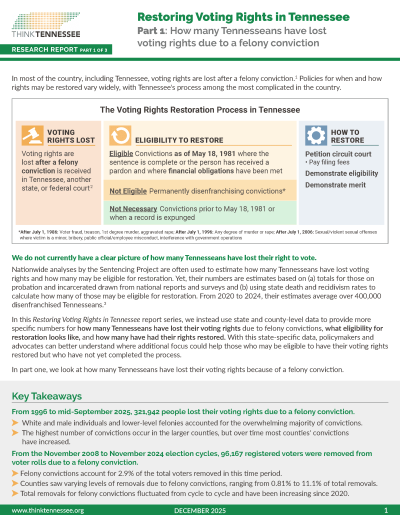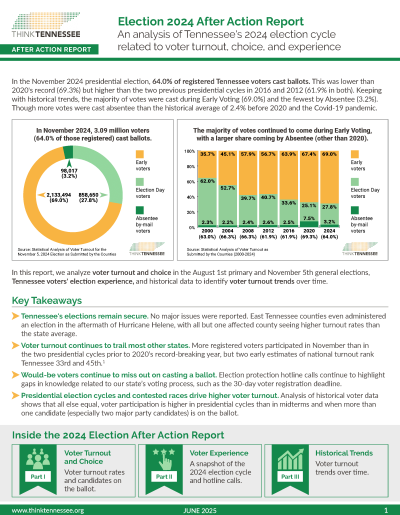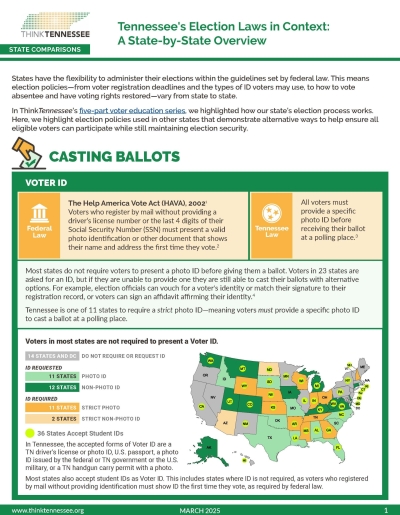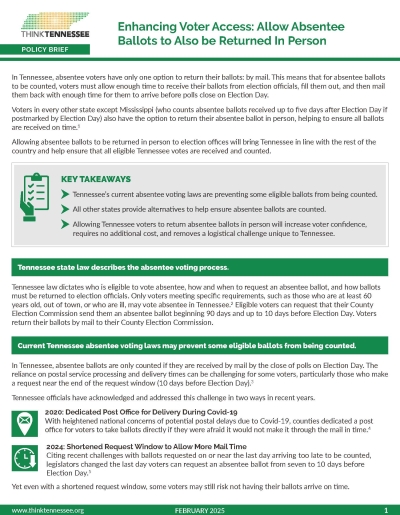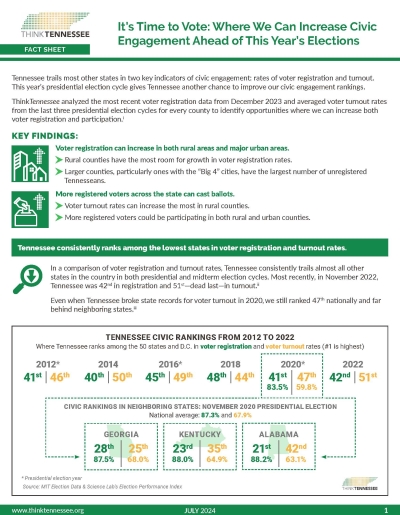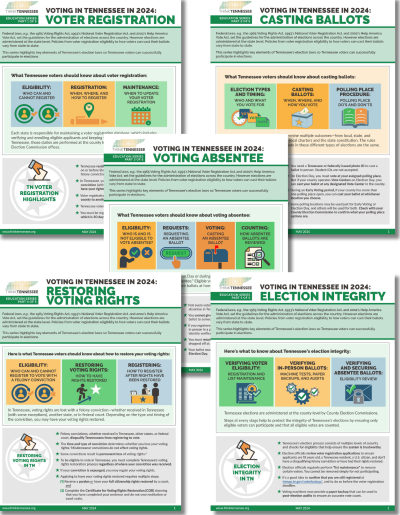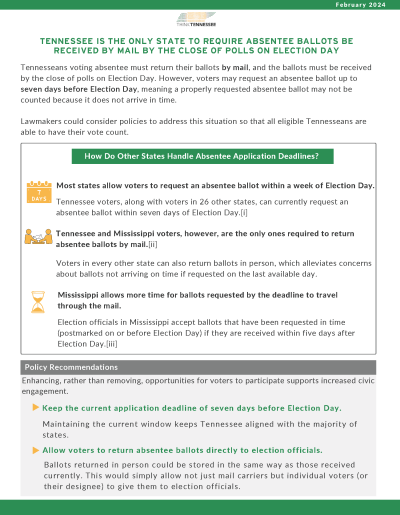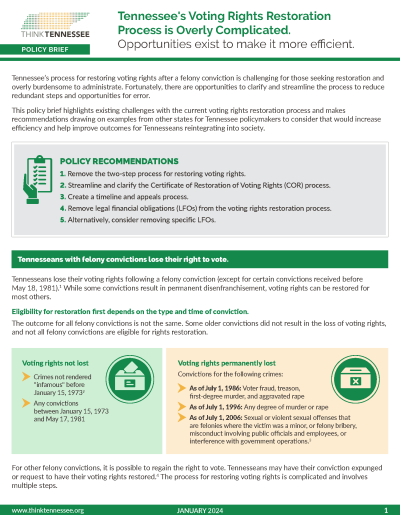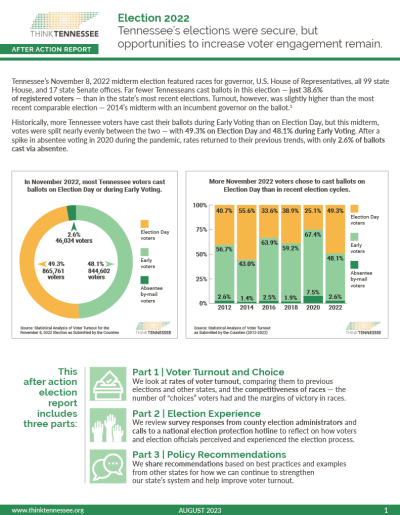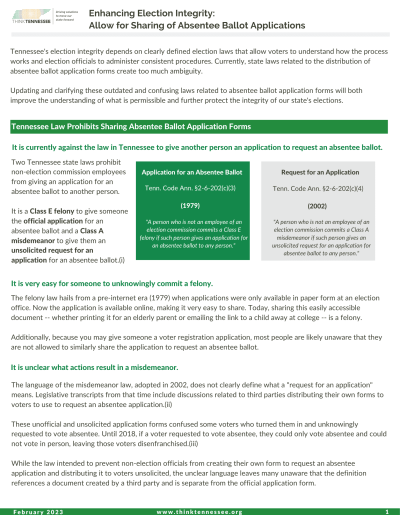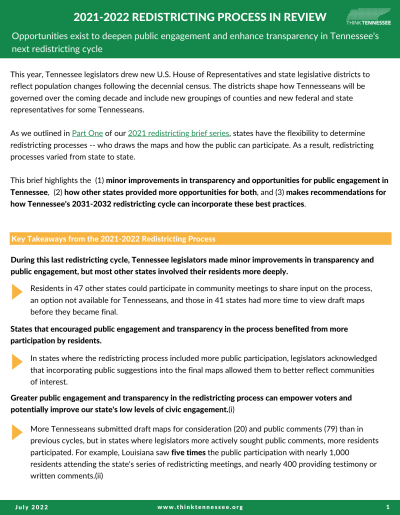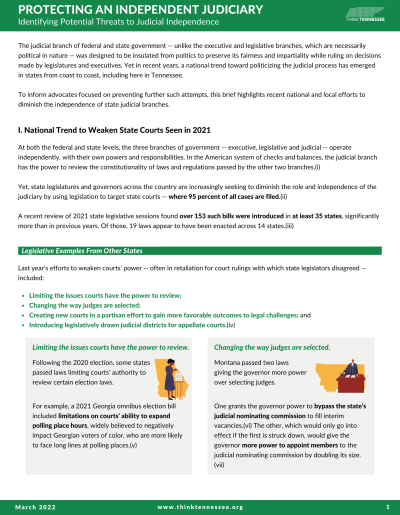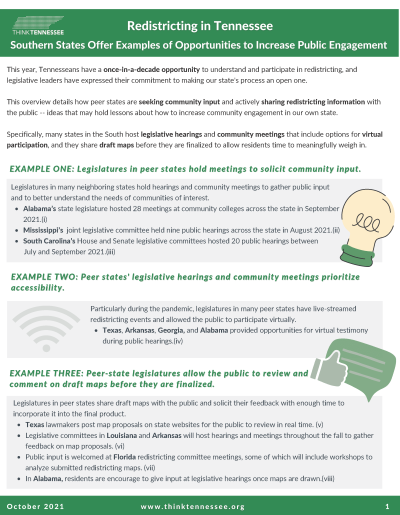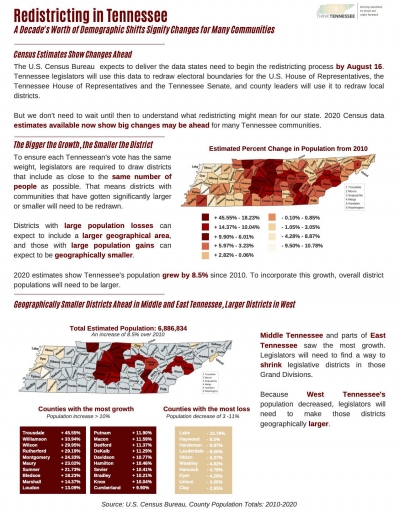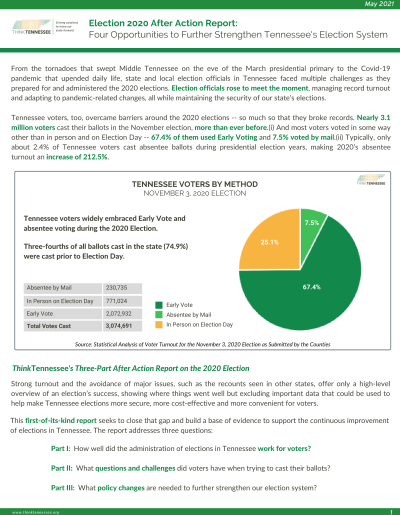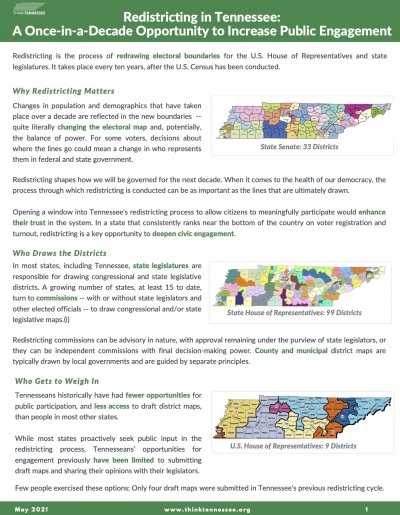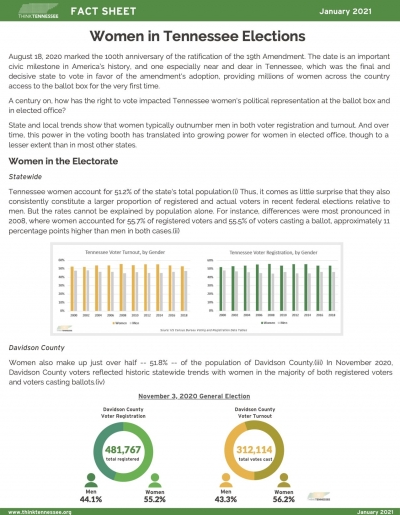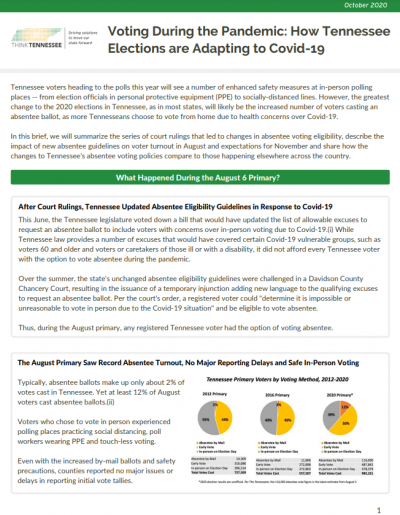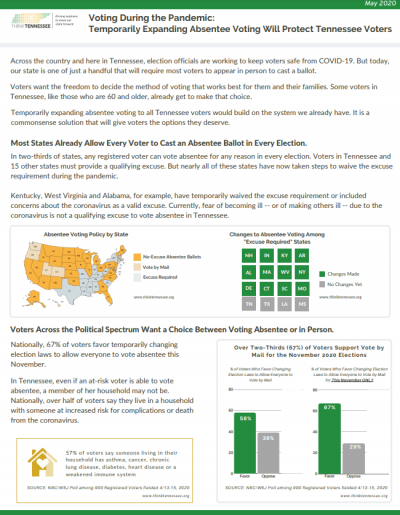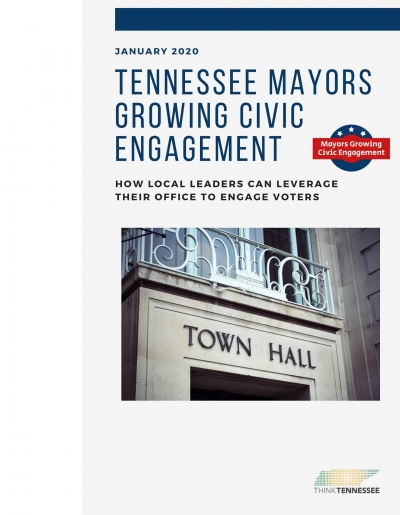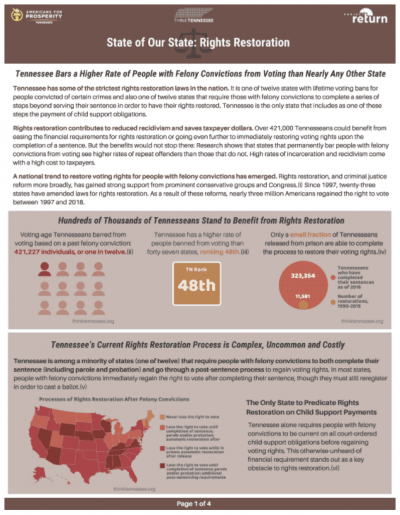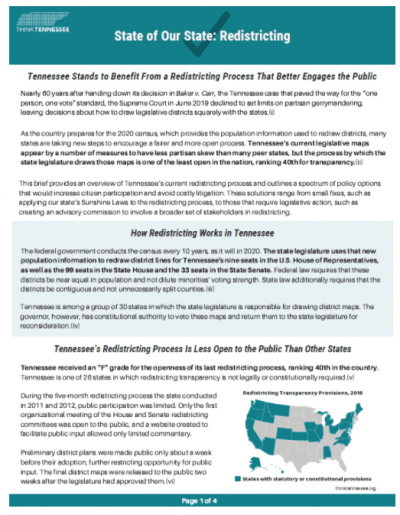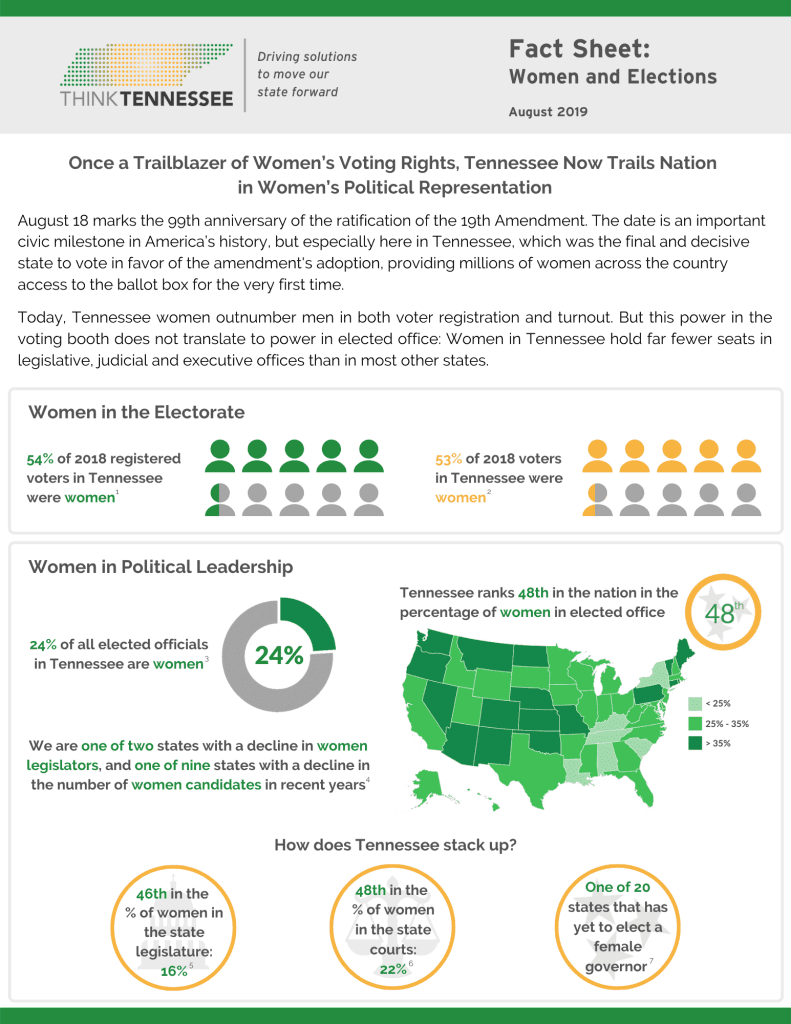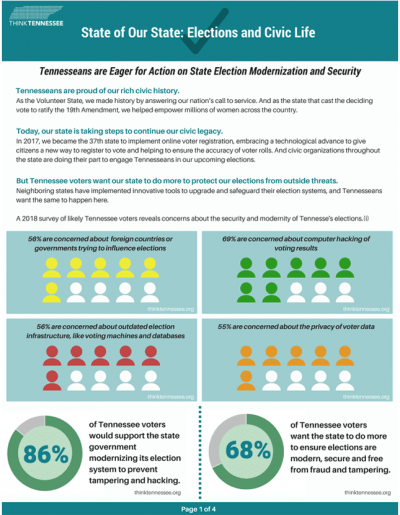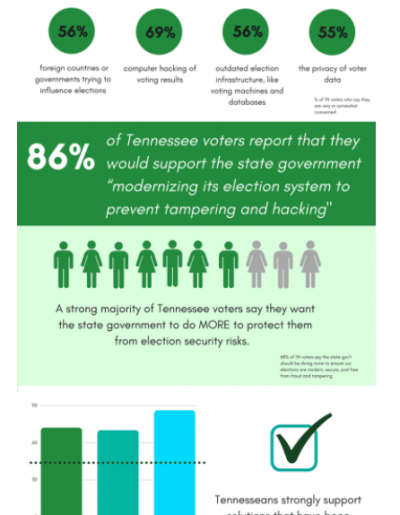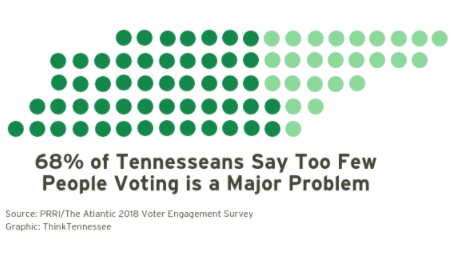Elections & Civic Life
RESTORING VOTING RIGHTS IN TENNESSEE PART 1: HOW MANY TENNESSEANS HAVE LOST VOTING RIGHTS DUE TO A FELONY CONVICTION (2025)
Tennesseans lose their voting rights after receiving a felony conviction, and with some exceptions and requirements, they could be eligible to have their rights restored. By analyzing state and county-level data, our new report series on voting rights restoration seeks to quantify how many Tennesseans have been impacted. In Part 1 of the series, we use criminal conviction and voter list maintenance data to find that since January 1996, 321,942 Tennesseans have lost their voting rights because of a felony conviction. And between the 2008 and 2024 election cycles, 96,167 Tennesseans were removed from voter rolls because of a felony conviction.
This report brings new insight into how many Tennesseans have lost their voting rights that has not previously existed at the state level. Understanding where those losses are concentrated can help policymakers and advocates determine where additional focus could help those who may be eligible to have their voting rights restored.
Our analysis primarily utilizes data from the Tennessee Department of Correction, the Tennessee Administrative Office of the Courts, and the U.S. Election Assistance Commission. Data files can be found here.
ELECTION 2024 AFTER ACTION REPORT (2025)
Our 2024 Election After Action report analyzes Tennessee’s 2024 election cycle through three lenses: voter turnout, voter choice, and voter experience, providing insights into the state’s historical election trends and highlighting some persistent challenges that continue to prevent some would-be voters from casting a ballot.
In November, 64.0% of registered Tennessee voters cast ballots — lower than record-breaking 2020 but higher than previous presidential elections in 2016 and 2012. With both parties fielding candidates in more August primary races, voters had a greater selection of candidates on their ballots in November 2024 compared to previous election cycles. As for voter experience, an analysis of calls to the election protection hotline finds that most Tennessee callers (74%) asked questions about voting – where and when to vote, the voter registration deadline, absentee voting, voter ID – while 26% reported issues or challenges that they experienced during the voting process.
Read our full analysis for our key takeaways from the 2024 election cycle in Tennessee and some opportunities to expand voting policies that could deepen voter engagement in our state.
TENNESSEE’S ELECTION LAWS IN CONTEXT: A STATE-BY-STATE OVERVIEW (2025)
States have the flexibility to administer their elections within the guidelines set by federal law, which means election policies vary from state to state. This new analysis compares election policies across all 50 states and D.C., highlighting where Tennessee differs among certain voting processes – from voter registration deadlines and the types of ID voters may use, to how to vote absentee and have voting rights restored.
ENHANCING VOTER ACCESS: ALLOW ABSENTEE BALLOTS TO ALSO BE RETURNED IN PERSON (2025)
Tennessee is one of only two states where voters are not allowed to return absentee ballots in person. In Tennessee, absentee ballots are only counted if they are received by mail by the close of polls on Election Day. The reliance on postal service processing and delivery times can be challenging for some voters, particularly those who make a request near the end of the request window (10 days before Election Day). Our policy brief provides an overview of the absentee voting process in Tennessee, current voting laws that may be preventing some eligible ballots from being counted, and best practices from other states for policymakers to consider implementing in Tennessee.
IT’S TIME TO VOTE: WHERE WE CAN INCREASE CIVIC ENGAGEMENT AHEAD OF THIS YEAR’S ELECTIONS (2024)
In a comparison of voter registration and turnout rates, Tennessee consistently trails almost all other states in the country in both presidential and midterm election cycles. But a deeper analysis at the county level reveals that there are specific communities where the need for civic investment is greatest.
Using voter registration data from the secretary of state and average voter turnout rates from the last three presidential election cycles for every county in Tennessee, our fact sheet identifies opportunities to increase civic engagement in both urban and rural communities.
Click the image to the right to read the full fact sheet. To view data tables detailing the average turnout rates and voter registration rates in each of Tennessee’s 95 counties, click here.
2024 TENNESSEE VOTER EDUCATION SERIES (2024)
The 2024 Tennessee Voter Education Series offers guidance on Tennessee’s election laws to ensure voters can successfully participate in Tennessee’s 2024 elections. The series is comprised of five policy briefs on critical aspects of the voting and elections process in Tennessee, including voter registration, casting a ballot, absentee voting, voting rights restoration, and election integrity. Each brief was developed specifically to be relevant in all 95 Tennessee counties.
- Part I: Voter Registration: This brief describes what Tennesseans should know about voter registration, including who can and cannot register, when, where, and how to register, and when to update one’s voter information. (Spanish version; Arabic version)
- Part II: Casting Ballots: This brief describes the various types and timing of elections in Tennessee. It also describes where, when, and how ballots may be cast, as well as the do’s and don’ts of polling place procedures. (Spanish version; Arabic version)
- Part III: Voting Absentee: This brief describes who is and is not eligible to vote absentee in Tennessee, as well as how to request and cast an absentee ballot. It also provides an overview of how absentee ballots are reviewed and counted once cast. (Spanish version; Arabic version)
- Part IV: Restoring Voting Rights: This brief describes who is eligible to have voting rights restored and the process for doing so in Tennessee. It also details how to register to vote once voting rights have been restored. (Spanish version; Arabic version)
- Part V: Election Integrity: This brief describes the steps and processes Tennessee uses to ensure the integrity of elections, including the verification of voter eligibility, in-person ballots, and absentee ballots. (Spanish version; Arabic version)
Click on the links above for PDFs of the individual briefs, or click the image to the right for a combined PDF file of all five briefs. We also have Spanish translations and Arabic translations of all five briefs.
Alternative formats of the briefs are available for download below:
- Part I: Voter Registration:
- Part II: Casting Ballots:
- Part III: Voting Absentee:
- Part IV: Restoring Voting Rights:
- Part V: Election Integrity:
TENNESSEE IS THE ONLY STATE TO REQUIRE ABSENTEE BALLOTS BE RECEIVED BY MAIL BY THE CLOSE OF POLLS ON ELECTION DAY (2024)
Tennesseans voting absentee must return their ballots by mail, and the ballots must be received by the close of polls on Election Day. However, voters may request an absentee ballot up to seven days before Election Day, meaning a properly requested absentee ballot may not be counted because it does not arrive in time.
This fact sheet describes how allowing absentee ballots to be returned in person enhances opportunities for Tennessee voters and supports increased civic engagement.
TENNESSEE’S VOTING RIGHTS RESTORATION PROCESS IS OVERLY COMPLICATED (2024)
Tennessee’s process for restoring voting rights after a felony conviction is challenging for those seeking restoration and overly burdensome to administrate. Fortunately, there are opportunities to clarify and streamline the process to reduce redundant steps and opportunities for error.
This policy brief highlights existing challenges with the current voting rights restoration process and makes recommendations drawing on examples from other states for Tennessee policymakers to consider that would increase efficiency and help improve outcomes for Tennesseans reintegrating into society.
To see the multiple steps required for Tennesseans to restore their voting rights, view our infographic.
ELECTION 2022 AFTER ACTION REPORT: TENNESSEE’S ELECTIONS WERE SECURE, BUT OPPORTUNITIES TO INCREASE VOTER ENGAGEMENT REMAIN (2023)
Tennessee’s November 8, 2022 midterm election featured races for governor, U.S. House of Representatives, all 99 state House, and 17 state Senate offices. While the election was safely and securely administered across the state, voter turnout continued to trail most other states, with only 38.6% of registered voters showing up to cast ballots. Calls to the national election protection hotline reveal that some would-be Tennessee voters continue to miss out on casting a ballot due to lack of information or challenges with some voting requirements, like missing voter registration deadlines or going to the wrong polling location after being placed in a new district. Voter choice was also limited in the November 2022 midterms, with more than half (53.9%) of the state legislative races featuring only one candidate.
Drawing on data from three sources – Tennessee calls to the election protection hotline, information shared by county election administrators, and examples from other states – this report shares four recommendations for policymakers to consider ahead of the next election cycle that could help improve voter turnout.
ENHANCING ELECTION INTEGRITY: ALLOW FOR SHARING OF ABSENTEE BALLOT APPLICATIONS (2023)
Current state laws criminalize giving an absentee ballot application form to another person. The laws are both outdated and confusing and create an opportunity for a Tennessean to unknowingly commit a felony.
This brief explains why updating and clarifying Tennessee laws related to absentee ballot application forms will both improve civic engagement and further protect the integrity of our state’s elections.
2021-2022 REDISTRICTING PROCESS KEY FINDINGS: OPPORTUNITIES EXIST TO DEEPEN PUBLIC ENGAGEMENT AND ENHANCE TRANSPARENCY IN TENNESSEE’S NEXT REDISTRICTING CYCLE (2022)
Public engagement and transparency in the redistricting process can empower voters and potentially improve our state’s low levels of civic engagement. In this last redistricting cycle, Tennessee legislators provided minor improvements in both engagement and transparency from 2011-2012, but most other states involved their residents more deeply.
This brief reviews 2021-2022 redistricting processes and makes recommendations for how Tennessee can incorporate best practices drawn from peer states for increasing transparency and public engagement in the 2031-2032 redistricting cycle.
Protecting an Independent Judiciary: Identifying Potential Threats to Judicial Independence (2022)
The framers of our federal and state constitutions separated the judicial branch from the executive and legislative branches to ensure that the court system could operate independently, prevent the concentration of unchecked power and preserve our constitutionally protected freedoms.
But in recent years, there have been an increasing number of attempts across the country to politicize the judicial process.
This brief describes these legislative efforts – from those that seek to change the issues that courts have the power to review to those that target judges and judicial powers – to increase awareness of potential challenges and help ensure Tennessee courts maintain their impartiality and independence.
Redistricting in Tennessee: Southern States Offer Examples of Opportunities to Increase Public Engagement (2021)
This year, Tennesseans have a once-in-a-decade opportunity to understand and participate in redistricting, and legislative leaders have expressed their commitment to making our state’s process an open one.
This overview details how peer states are seeking community input and actively sharing redistricting information with the public — ideas that may hold lessons about how to increase community engagement in our own state.
Specifically, many states in the South host legislative hearings and community meetings that include options for virtual participation, and they share draft maps before they are finalized to allow residents time to meaningfully weigh in.
Redistricting in Tennessee: A Decade’s Worth of Demographic Shifts Signify Changes for Many Communities (2021)
To ensure each Tennessean’s vote has the same weight, legislators are required to draw electoral districts with roughly equivalent numbers of people. While the U.S. Census Bureau expects to deliver the data states need to begin the redistricting process by August 16, estimates available now show changes may be ahead for some Tennessee communities due to population shifts. This one-pager analyzes the latest Census data estimates to highlight the counties where legislative districts may need to grow, and where they may need to shrink.
Election 2020 After Action Report: Four Opportunities to Further Strengthen Tennessee’s Election System (2021)
From the tornadoes that swept parts of Tennessee on the eve of the March presidential primary to the Covid-19 pandemic that upended daily life, Tennessee voters and local election officials faced incredible challenges leading up to the 2020 presidential election. But as became clear in the months that followed, Tennesseans had risen to meet the moment: Our state saw its highest-ever voter turnout and avoided the recounts that plagued other states.
Yet in a state that consistently trails in voter turnout, some would-be voters here didn’t cast a ballot because they struggled to navigate the voter-registration process. And had a recount been required, most Tennessee counties would not have been able to produce the paper backups that are key to that process.
Using feedback from the frontline, including data from the more than 800 calls Tennesseans placed to a national nonpartisan hotline, as well as interviews with 15 Tennessee election administrators, this first-of-its-kind analysis offers a retrospective look at the November 2020 election in Tennessee. It highlights the state’s strengths and sheds new light on areas where changes to public policy could streamline the voting process and further secure our elections.
Redistricting in Tennessee:
A Once-in-a-Decade Opportunity to Increase Public Engagement (2021)
The Tennessee General Assembly will begin redrawing electoral boundaries for its congressional and legislative districts this year. The process, formally known as redistricting, occurs every ten years. Because of its infrequency, there is an urgent need to explain the specifics of how maps are typically drawn and approved, especially the ways in which citizens can engage.
Our new three-part policy brief series on redistricting does just that, detailing actors, timelines, legal guidelines and process history here in Tennessee. The final brief also includes a number of new recommendations for ways that meaningful public engagement opportunities can be expanded during the 2021-2022 cycle.
- Part I: Redistricting Laws and Timelines:Describes the federal and state laws governing redistricting, along with general timelines and map-drawing requirements.
- Part II: Redistricting in Tennessee (2011-2012): Describes how Tennessee’s most recent redistricting process worked and who was responsible for it.
- Part III: Recommendations to Enhance Public Trust: Provides a list of four proven ideas legislators should consider if they want to give voters an opportunity to more fully engage with the redistricting process.
Women in Tennessee Elections Fact Sheet (2021)
August 18, 2020 marked the 100th anniversary of the ratification of the 19th Amendment. The date is an important civic milestone in America’s history, and one especially near and dear in Tennessee, which was the final and decisive state to vote in favor of the amendment’s adoption, providing millions of women across the country access to the ballot box for the very first time.
A century on, how has the right to vote impacted Tennessee women’s political representation at the ballot box and in elected office?
State and local trends show that women typically outnumber men in both voter registration and turnout. And over time, this power in the voting booth has translated into growing power for women in elected office, though to a lesser extent than in most other states.
Voting During the Pandemic: How Tennessee Elections are Adapting to Covid-19 (October 2020)
Tennessee voters casting ballots in person saw a number of enhanced safety measures at polling places, and more Tennesseans were eligible to cast absentee ballots. This brief highlights the Covid-19 pandemic’s impact on Tennessee elections in 2020.
Voting with Conviction: Voting Rights and Voting Restoration in Tennessee (2020)
The story of voting in Tennessee today cannot be told without acknowledging that Tennessee’s voter registration and turnout rates are some of the worst in the nation. Moreover, participation rates show a racial disparity: Voter registration and turnout rates among Black and Hispanic voters in Tennessee typically lag those of white voters. This article, originally published by The University of Memphis Benjamin L. Hooks Institute for Social Change, explores the history of efforts to secure voting rights before delving deeply into one of the most significant examples of formal voter disenfranchisement – the potentially permanent removal of voting rights after conviction for a felony.
Voting During the Pandemic: Temporarily Expanding Absentee Voting Will Protect Tennessee Voters (May 2020)
The Covid-19 pandemic altered the way states administer elections, with many waiving excuses to vote absentee. This brief advocates for Tennessee lawmakers to similarly call Covid-19 as a valid excuse for voters to vote absentee in 2020.
Tennessee Mayors Growing Civic Engagement: How Local Leaders Can Leverage Their Office to Engage Voters (2020)
Tennessee Mayors Growing Civic Engagement is a cohort of city and county mayors from across the state making civic engagement a priority. This report highlights why mayors are well-placed to lead civic engagement efforts and shares examples from the participating Tennessee mayors on how they are working to deepen engagement in their communities.
State of Our State: Rights Restoration (2019)
Developed in partnership with Americans for Prosperity and Project Return, this policy brief addresses the state of rights restoration in Tennessee—which bars a higher rate of people with felony convictions from voting than nearly any other state.
In addition to describing the unprecedented challenges people with felony convictions face when trying to restore their right to vote, the brief highlights the potential benefits of rights restoration, including cost savings for taxpayers and reductions in recidivism rates. It also outlines a spectrum of policy solutions that could help Tennesseans reenter society more successfully.
State of Our State: Redistricting (2019)
Nearly 60 years after handing down its decision in Baker v. Carr, the Tennessee case that paved the way for the “one person, one vote” standard, the Supreme Court in June 2019 declined to set limits on partisan gerrymandering, leaving decisions about how to draw legislative districts squarely with the states.
This brief provides an overview of Tennessee’s current redistricting process and outlines a spectrum of policy options that would increase citizen engagement and avoid costly litigation.
Women in the Electorate Fact Sheet (2019)
Tennessee women outnumber men in both voter registration and turnout. But this power in the voting booth does not translate to power in elected office: Women in Tennessee hold far fewer seats in legislative, judicial and executive offices than in most other states.
Civic Engagement in Tennessee: Takeaways from Six Community Conversations About Our State’s Civic Health (2019)
To understand why many Tennesseans choose not to participate in elections, ThinkTennessee partnered with Humanities Tennessee and the Tennessee Press Association to co-host a series of Community Conversations across the state in the lead-up to the November 2018 election. This report summarizes what the over 100 Tennesseans who participated in the series, from Memphis to Kinsport, shared as perceived challnges to civic engagement in our state.
State of Our State: Elections and Civic Life (2018)
This policy brief addresses election modernization and security efforts, both inside and outside of the state, from voter-verified paper audit trails to Secure Electronic Transfer of voter registration information.
Election Security Survey (2018)
ThinkTennessee commissioned a statewide survey of 700 likely Tennessee voters. The live-interview telephone survey was conducted Jan. 23-25, 2018 by Revily Insights.
The results underscore the need to implement modern policies and procedures to protect the integrity and security of Tennessee’s physical and digital election infrastructure.
During the 2020 legislative session, the Tennessee General Assembly passed new bills related to election security and voter registration drives. See ThinkTennessee’s summary of these new laws here.
Civic Infrastructure Survey (2018)
A 2018 Voter Engagement Survey finds gaps in Tennessee’s civic infrastructure. 68% of Tennesseans say too few people voting is a major problem and a majority of voters unsure about voting eligibility requirements.

